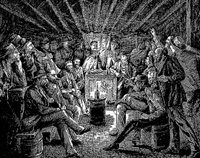Old, and getting younger all the time
 Watch TV or read a magazine in the US, and before long you'll notice how many, many advertisements there are for medicines and treatments for ailments that are usually associated with ageing.
Watch TV or read a magazine in the US, and before long you'll notice how many, many advertisements there are for medicines and treatments for ailments that are usually associated with ageing.Incontinence, grey hair, heartburn, muscle pain relief, diabetes, cancer, osteoporosis, cholesterol, heart disease and all of these in just one edition of "Reader's Digest." There are a few more as well, but for more esoteric ailments such as "Restless Leg Syndrome."
Pick up a copy of any magazine in Europe or Asia, and it's a fair bet that the most you'll come across is an advertisement for tampons or cold relief.
Why the difference? Where does America's obsession with wellness and health come from, and why hasn't the rest of the world got it?
For a start, America's completely obsessed with youth. Looking young, feeling young, acting young. Watch those advertisements for medicines and you'll see everyone enjoying carefree, active, often frivolous moments in celebration of their health and vitality. The American mania about looking years younger is a disease that's spreading around the world. Why is it, for example, that 75% of the advertisements we see on British television for beauty products are poorly-dubbed American ads?
So why is America so youth-obsessed? Well, the United States is a young country, for a start. At 230 years of age, America's barely out of its teens, a swaggering, well-built kid that plays on its high school football team, has an occasional problem with acne (Vietnam, Iraq, etc) and that regularly wins the election for class president because nobody else thinks they can win.
So, to live and prosper in this young country, Americans feel they have to be young too. Success in the US has always been measured in fairly simple terms - tangible signs - and the country has always rewarded the kind of effort that a younger person can give. So the guy that works two jobs to support his dream, and the girl that works her way through medical school, will both end up with their tangible signs of success, but at what cost later on?
The ailments that most commonly feature in medicine advertisements seem to be those that reflect a stressful, busy life and a relative lack of care taken of the body. So while youth is the most valued tool for success, it's the one thing that you're guaranteed to lose fastest while in pursuit of that success. And that's why it's the one thing that's prized above all others.
Quick sidetrack: I see that Cadillac, the car maker once favoured by the elderly for their large, unfeasibly heavy and well-suspended barges, is now also having to freshen up its image. And to do this, they're designing sporty cars that yuppies might allow themselves to be seen in, and advertising them on television by using Led Zeppelin's "Rock & Roll". I smell an attack of youth.
Here's another theory. America believes anything can be fixed. Whether it's a city flattened by a natural disaster or a Middle Eastern nation that refuses to see the error of its political ways, or a salesman's sense of guilt at having sold an expensive car to a couple that can't afford it. The disaster will need money and effort and time, the Middle Eastern state will need invading, while the salesman will need religion or self-help to overcome his self-loathing. America can supply all of those.
So the body is just another thing that needs to be fixed, like a car. Pull up to the garage, pop the hood and let a mechanic peer inside. He'll prescribe an oil change, maybe change the brake pads, and recommend that you go easy on the brakes in future. And you'll thank him, pay him and screech off, having listened but not heard.
I think the main lesson here is that the Old World, which is basically the rest of the world, has long ago come to terms with age and its symptoms. If we look back to Victorian times and note the immense interest in medicine and in quack remedies, we can see a sort of parallel with the America of today: the belief that oOnce we've mastered our environment, then we can master ourselves. The Victorians eventually got over their obsession with health. We'll have to wait and see whether America does.


